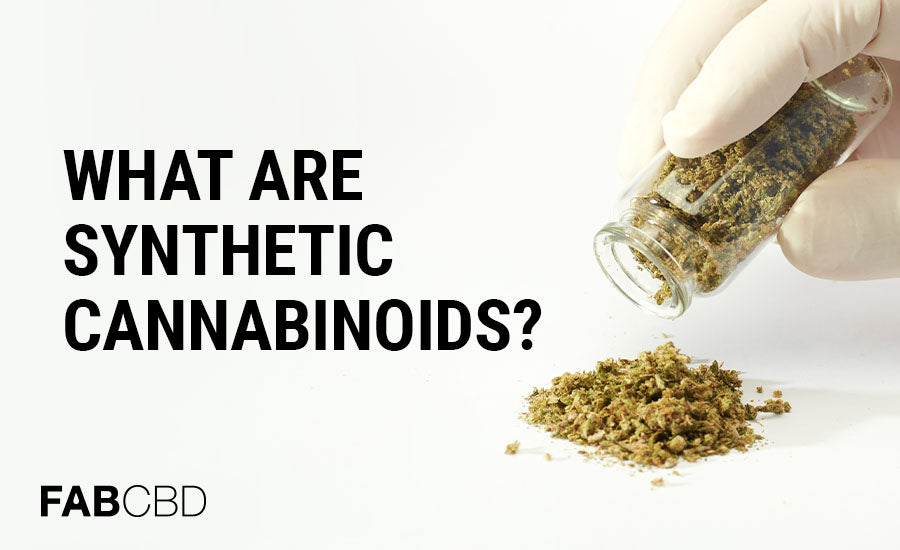With the increasing popularity of cannabis, we have also seen the rise of synthetic cannabinoids, a promised “legal alternative” to cannabis for places where cannabis consumption is still banned.
These synthetic cannabinoids claim to have similar effects, but there are a lot of misconceptions about their legality, their effects, and their safety.
That’s why, here, we’ll go through everything you need to know about synthetic cannabinoids, where they come from, and how they might impact your health.
Let’s dive right in!
What Are Synthetic Cannabinoids?
Synthetic cannabinoids are chemically engineered compounds designed to mimic the effects of natural cannabinoids found in the Cannabis plant, like THC and CBD, artificially created in laboratories. These artificial cannabinoids often share a similar chemical structure to THC (tetrahydrocannabinol), the psychoactive component of cannabis, but can be much more potent.
They usually go by street names like K2, Black Mamba, Kronic, Genie, and Spice, and are sold in some areas as herbal products, herbal incense, potpourri, or in liquid form for use in e-cigarettes. They can also be marketed under multiple brand names as legal alternatives to marijuana, sometimes even legally sold at convenience stores.
However, while natural cannabinoids have been around for millennia and have been safely used for a long time, new synthetic cannabinoids are unpredictable and can cause multiple side effects including nausea, anxiety, and even life-threatening conditions.
Synthetic cannabinoids bind to the same cannabinoid receptors in the brain as THC but, since they’re artificial, they may bind more strongly, resulting in more potent and unpredictable psychoactive effects.
Semi-synthetic cannabinoids are even newer compounds derived from natural cannabinoids from plant material, but modified in the laboratory to produce specific effects or enhance potency, although these also haven’t been properly studied.
The Origin and Manufacture of Synthetic Cannabinoids
Synthetic cannabinoids originated with the research of John W. Huffman in the 1980s, who developed these compounds for scientific purposes, intending to study the endocannabinoid system. Huffman's research aimed to create analogs of THC, the psychoactive component of cannabis, to study cannabinoid receptors and better understand their role in the human body.
However, the lack of regulation and oversight has led to the widespread production and distribution of synthetic cannabinoids for recreational use, often manufactured overseas in unregulated environments, taking advantage of the limited regulatory controls to mass produce and distribute dubious products.
Health Risks and Side Effects
As previously mentioned, there are multiple health risks and adverse effects associated with the use of synthetic cannabinoids, which can range from mild to severe and may include nausea, vomiting, anxiety, hallucinations, seizures, chest pain, and increased heart rate and blood pressure. Severe cases may lead to kidney injury, psychosis, cardiovascular issues, and even death.
Since they’re mostly unregulated they have unpredictable potency and varying chemical compositions, there’s no way of knowing what kind of effects the user will get in advance.
Manufacturers frequently alter chemical formulas to evade legal restrictions, resulting in a constant influx of new compounds with slightly different active ingredients capable of causing completely unknown health effects. The lack of regulation and general knowledge of synthetic cannabinoid products ends up making it challenging for healthcare providers and poison centers to anticipate and treat their specific effects when a user ends up requiring medical intervention.
Legal Status and Availability
The legal status of synthetic marijuana products varies globally, with many countries and states increasingly implementing bans on specific compounds or classes of synthetic cannabinoids. For example, the United States Drug Enforcement Agency (DEA) classifies most synthetic cannabis substances as Schedule I substances, illegal for recreational use, although some makers try to get around regulation by placing in their products a “not for human consumption” disclaimer.
However, as synthetic cannabinoids keep evolving, they keep complicating regulatory efforts which are always trying to catch up with new, technically legal variants that are constantly pushed into the market.
Why People Use Synthetic Cannabinoids
People may feel more inclined to use synthetic cannabis products when they lack access to real cannabis products, usually because they’re illegal in that area. Since some synthetic cannabinoids are marketed as legal alternatives, they might not get the user in trouble with law enforcement, at least at first, which can help spread the misconception that synthetic cannabinoids are safe psychoactive substances.
Additionally, since synthetic cannabinoids usually don’t show up in toxicology reports, some users may view them as an alternative to avoid detection in drug tests.
However, as we’ve described, synthetic cannabinoids may pose serious health risks, and shouldn’t be considered safe even if they’re not yet illegal.
Synthetic Cannabinoids vs. Other Psychoactive Substances
While synthetic cannabinoids mimic the effects of THC and interact with cannabinoid receptors, synthetic cathinones, like the ones in bath salts, act as stimulants affecting the central nervous system, and opioids are depressants targeting opioid receptors. They all have different levels of legality but are often used as somewhat legal psychoactive alternatives.
The evolving landscape of new psychoactive substances encompasses a wide array of novel chemically engineered designer drugs made to produce psychoactive effects, posing challenges for regulatory bodies around the world striving to address emerging public health concerns every time a new and dangerous compound arises.
Conclusion
As we’ve seen, synthetic cannabinoids are new compounds that, although might be legal in some places, are not regulated and the effects of synthetic cannabinoids have not been properly studied, so they’re capable of potentially fatal side effects.
Instead of using potentially harmful and unknown compounds, choose between the multiple natural cannabinoid products available that are lab-tested and far safer for consumption.
Check out our online CBD store and browse our selection of safe, natural cannabinoid products!
Synthetic Cannabinoids FAQs
Here are the answers to commonly asked questions on synthetic cannabinoids:
What are the most common side effects of synthetic cannabinoids?
The most common side effects of synthetic cannabinoids include nausea, vomiting, anxiety, hallucinations, seizures, increased heart rate, and, in severe cases, kidney damage and life-threatening conditions. The unpredictable potency and varying chemical compositions in SC contribute to the variability of effects and adverse reactions.
How do synthetic cannabinoids differ from natural cannabinoids?
Synthetic cannabinoids are artificially engineered compounds designed to mimic the effects of natural cannabinoids found in the Cannabis plant. While natural cannabinoids like THC and CBD have specific and well-known effects, synthetic cannabinoids may have unpredictable potency, varying chemical structures, and different interactions with cannabinoid receptors.
Are synthetic cannabinoids legal?
The legal status of synthetic cannabinoids varies by country and region. In many places, certain synthetic cannabinoids are classified as controlled substances due to their psychoactive effects. However, the constantly changing chemical compositions and the introduction of new variants make regulation challenging.
Why do people use synthetic cannabinoids despite their risks?
People may use synthetic cannabinoids due to misconceptions about their safety and legality. Some believe that these substances offer a legal alternative to natural cannabis or seek to avoid detection in drug tests. However, the unpredictable potency and health risks associated with synthetic cannabinoids can lead to severe adverse effects, regardless of legality.
Can synthetic cannabinoids be detected in drug tests?
While standard drug tests often target common substances like THC, synthetic cannabinoids may not be included in routine screening panels. However, some specialized tests can detect specific synthetic cannabinoids.







